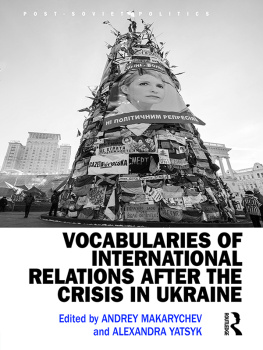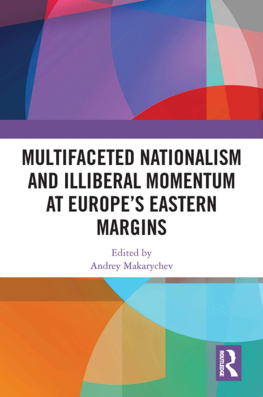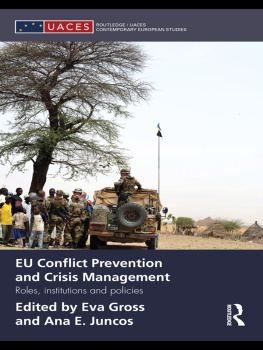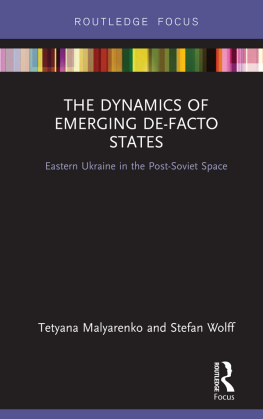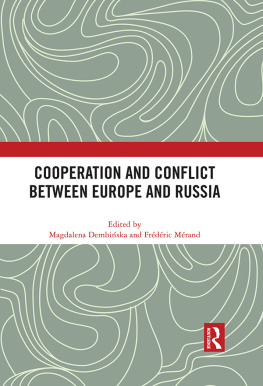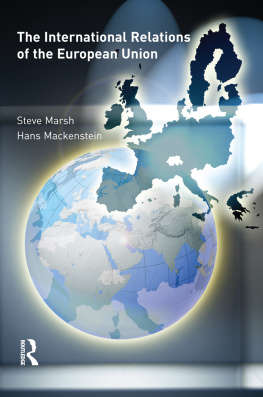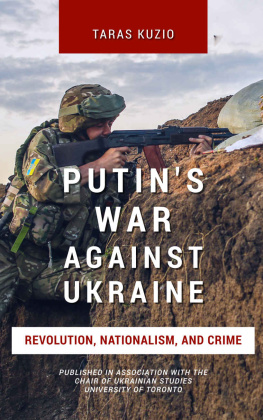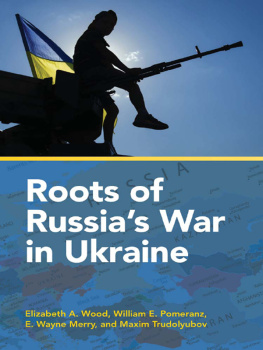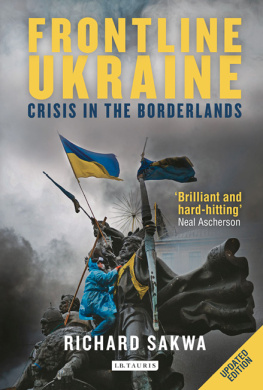Vocabularies of International Relations after the Crisis in Ukraine
The conflict in Ukraine and Russias annexation of Crimea has undoubtedly been a pivotal moment for policy makers and military planners in Europe and beyond. Many analysts see an unexpected character in the conflict and expect negative reverberations and a long-lasting period of turbulence and uncertainty, the de-legitimation of international institutions and a declining role for global norms and rules. Did these events bring substantial correctives and modifications to the extant conceptualization of international relations? Does the conflict significantly alter previous assumptions and foster a new academic vocabulary, or, does it confirm the validity of well-established schools of thought in international relations? Has the crisis in Ukraine confirmed the vitality and academic vigour of conventional concepts?
These questions are the starting points for this book covering conceptualizations from rationalist to reflectivist, and from quantitative to qualitative. Most contributors agree that many of the old concepts, such as multi-polarity, spheres of influence, sovereignty, or even containment, are still cognitively valid, yet believe the eruption of the crisis means that they are now used in different contexts and thus infused with different meanings. It is these multiple, conceptual languages that the volume puts at the centre of its analysis.
This text will be of great interest to students and scholars studying international relations, politics, and Russian and Ukrainian studies.
Andrey Makarychev is Guest Professor at the Johan Skytte Institute of Political Science, University of Tartu, Estonia. He has published many books and research articles on a variety of topics related to Russian foreign policy.
Alexandra Yatsyk is Visiting Researcher at the Centre for Russian and Eurasian Studies, University of Uppsala, Sweden, and Head of the Centre for Cultural Studies of Post-Socialism, Kazan Federal University, Russia.
Post-Soviet Politics
Series Editor Neil Robinson
The last decade has seen rapid and fundamental change in the countries of the former Soviet Union. Although there has been considerable academic comment on these changes over the years, detailed empirical and theoretical research on the transformation of the post-Soviet space is only just beginning to appear as new paradigms are developed to explain change.
Post-Soviet Politics is a series focusing on the politics of change in the states of the former USSR. The series publishes original work that blends theoretical development with empirical research on post-Soviet politics. The series includes work that progresses comparative analysis of post-Soviet politics, as well as case study research on political change in individual post-Soviet states. The series features original research monographs, thematically strong edited collections and specialized texts.
Uniquely, this series brings together the complete spectrum of work on post-Soviet politics, providing a voice for academics world wide.
Most recent published titles
Euro-Atlantic Discourse in Georgia: The Making of Georgian Foreign and Domestic Policy After the Rose Revolution
Frederik Coene
Systemic and Non-Systemic Opposition in the Russian Federation: Civil Society Awakens?
Edited by Cameron Ross
Autocratic and Democratic External Influences in Post-Soviet Eurasia
Edited by Anastassia Obydenkova and Alexander Libman
Religion, Politics and Nation-Building in Post-Communist Countries
Edited by Greg Simons and David Westerlund
Vocabularies of International Relations after the Crisis in Ukraine
Edited by Andrey Makarychev and Alexandra Yatsyk
Neighbourhood Perceptions of the Ukraine Crisis
From the Soviet Union into Eurasia?
Edited by Gerhard Besier and Katarzyna Stokosa
First published 2017
by Routledge
2 Park Square, Milton Park, Abingdon, Oxon OX14 4RN
and by Routledge
711 Third Avenue, New York, NY 10017
Routledge is an imprint of the Taylor & Francis Group, an informa business
2017 Selection and editorial matter: Andrey Makarychev and Alexandra Yatsyk; individual chapters: the contributors
The right of the Andrey Makarychev and Alexandra Yatsyk to be identified as the authors of the editorial material, and of the authors for their individual chapters, has been asserted in accordance with sections 77 and 78 of the Copyright, Designs and Patents Act 1988.
All rights reserved. No part of this book may be reprinted or reproduced or utilised in any form or by any electronic, mechanical, or other means, now known or hereafter invented, including photocopying and recording, or in any information storage or retrieval system, without permission in writing from the publishers.
Trademark notice: Product or corporate names may be trademarks or registered trademarks, and are used only for identification and explanation without intent to infringe.
British Library Cataloguing in Publication Data
A catalogue record for this book is available from the British Library
Library of Congress Cataloging in Publication Data
Names: Makarychev, A. S. (Andrey Stanislavovich), editor. | Yatsyk, Alexandra, editor.
Title: Vocabularies of international relations after the crisis in Ukraine / edited by Andrey Makarychev and Alexandra Yatsyk.
Description: New York, NY : Routledge, 2016. | Series: Post-soviet politics | Includes bibliographical references and index.
Identifiers: LCCN 2016017612 | ISBN 9781472488602 (hardback) | ISBN 9781315457338 (ebook)
Subjects: LCSH: World politics--21st century. | International relations. | Ukraine Conflict, 2014---Influence.
Classification: LCC JZ1310 .V63 2016 | DDC 327--dc23
LC record available at https://lccn.loc.gov/2016017612
ISBN: 978-1-4724-8860-2 (hbk)
ISBN: 978-1-3154-5733-8 (ebk)
Mikhail Alexseev is Professor of Political Science at the San Diego State University, USA. He is an internationally recognized authority on threat assessment in interstate and internal wars, ethnic relations, immigration attitudes, and nationalism, with a focus on Eurasia. He is the author of Immigration Phobia and the Security Dilemma: Russia, Europe, and the United States (Cambridge, 2006) and Without Warning: Threat Assessment, Intelligence, and Global Struggle (St. Martins/Macmillan, 1997) and is the editor of A Federation Imperiled: Center-Periphery Conflict in Post-Soviet Russia (St. Martins/Macmillan, 1999). His research has been published in Political Science Quarterly, Journal of Peace Research, Political Behavior, Political Communication, Social Science Quarterly, Post-Soviet Studies, Europe-Asia Studies, Geopolitics and other journals.
Alexander Astrov is Associate Professor at the International Relations Department of Central European University (Budapest, Hungary). He is the author of On World Politics: R.G. Collingwood, Michael Oakeshott and Neotraditionalism in International Relations (Palgrave, 2005) and Self-founded Community: Minority Politics or Minor Politics? (Tallinn University Press, 2007) and the editor of

